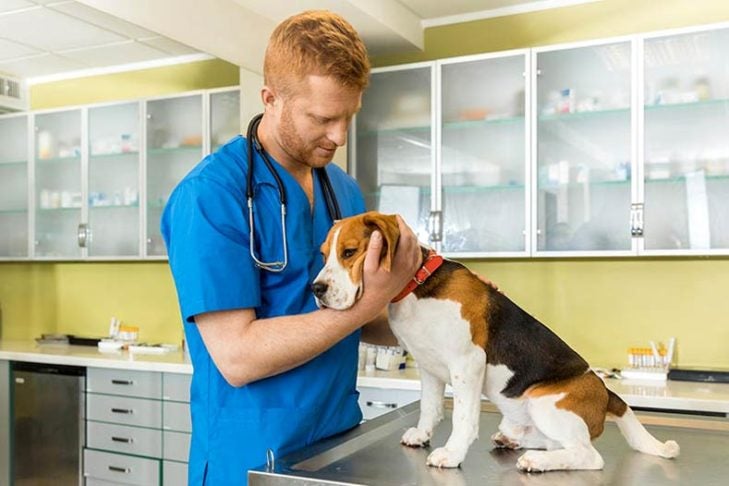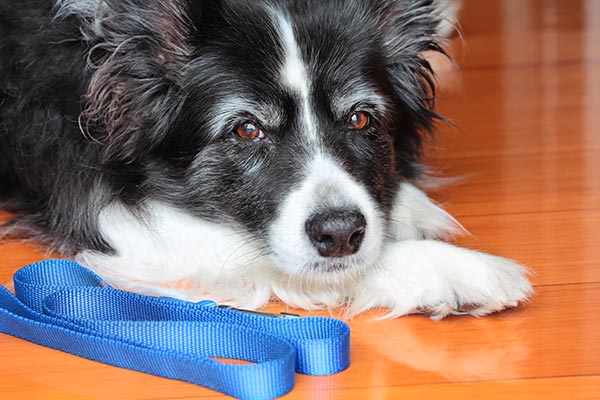
Cancer. The word sends a chill down our spines, whether it is in regard to ourselves, our human loved ones, or our dogs. Cancer is scary, and it makes us feel out of control. This is especially true if you own a dog breed with a predisposition to cancer.
Luckily, when it comes to bladder cancer, researchers have developed a test, called the CADET Braf Mutation Assay, that can help owners get an accurate diagnosis before it is too late. If your dog is one of these at-risk breeds, you’ve probably also wondered why your dog is at risk, and what, if anything, you can do to reduce those risks.
We reached out to veterinarians to see what they had to say about bladder cancer in dogs, breed predispositions, and the CADET Braf test, so that you have the information you need to make the most informed decision about your dog’s health.
What Is Bladder Cancer?
There are two types of bladder cancer: transitional cell carcinoma (TCC) and urothelial carcinoma (UC). These tumors start off in the urinary tract, but can metastasize to other parts of the body, including the bone, liver, kidney, spleen, and skin.
While bladder cancer is relatively rare, representing an estimated 1 to 2 percent of all canine cancer, it does appear to be on the rise, affecting more than 50,000 dogs every year. Certain breeds have a much higher chance of developing this type of cancer than others.

What Breeds Are Predisposed to Bladder Cancer?
The breeds primarily affected, according to the veterinarians we spoke with, are:
- Scottish Terrier
- West Highland White Terrier
- Beagle
- Shetland Sheepdog
- Wire Fox Terrier
- American Eskimo Dog
These breeds seem to be the highest risk breeds, or at least the ones seen and studied most often, but the researchers behind the CADET Braf test have identified a few more dog breeds that could also be at risk:
- Australian Cattle Dog
- Australian Shepherd
- Bichon Frise
- Border Collie
- Parson Russell Terrier
- Lhasa Apso
- Rat Terrier
- Russell Terrier
The exact reasons for why these breeds are predisposed are unknown, although there are a few theories.
Veterinary oncology specialist Dr. Theresa Arteaga, of the Animal Cancer Center of Monterey, says that researchers have discovered potential correlations between obesity and pesticides in West Highland White Terriers and bladder cancer, suggesting that there could be a correlation between pesticides, obesity, and bladder cancer in certain breeds, although more research is needed to confirm these findings.
Dr. Betsy Sigmon, a veterinarian from North Carolina, agrees. “Genetics and environmental factors, like smoking or living near a golf course or yards that apply large amounts of insecticides and herbicides, may increase a dog’s risk factors,” she says. She also speculates that researchers may discover a link between bacterial infections like bartonella, which affect the transitional cell lining of the urinary tract, and cancerous mutations, in the future.
While the exact reasons behind why certain breeds are predisposed may not be crystal clear, what we do know is that at-risk breeds between the ages of 6 and 11 are, on average, more likely to be diagnosed with bladder cancer than other breeds. This knowledge can help owners be on the lookout for the warning signs of bladder cancer.

What Are the Warning Signs of Bladder Cancer?
Bladder cancer is tricky to diagnose and can mimic signs of other lower urinary tract diseases, like urinary tract stones and infections. We spoke with Dr. Arteaga and Dr. Lindsay Thalheim, an oncology specialist and professor of oncology at Cornell University College of Veterinary Medicine, about the warning signs of bladder cancer they feel owners should be aware of.
Both Dr. Arteaga and Dr. Thalheim agreed that the most common symptoms of bladder cancer in dogs are:
- urinating small amounts frequently
- difficulty urinating
- bloody or discolored urine
- accidents in the house
Some dogs may also develop persistent urinary tract infections that do not resolve with treatment. It is important to remember, too, that any changes in urination habits, especially bloody urine or difficulty urinating, require a call to your veterinarian’s office. These symptoms could also be the result of other serious urinary tract diseases that may require medical treatment.
What Can Owners Do to Prevent Bladder Cancer?
If you own a high-risk breed, you’re probably wondering if there is anything you can do to lower your dog’s risk factors.
Dr.Thalheim says that while “there isn’t anything definitive that will prevent the development of bladder cancer, owners can limit exposure to herbicides and insecticides.” She also points to a study that found a link between feeding vegetables three times a week and reduced bladder cancer risk in certain breeds, although owners should be careful to only feed safe vegetables to their dogs and to work with their veterinarian to come up with a dietary plan.
As for breeders, she recommends not breeding dogs diagnosed with TCC/UC and suggests that breeders ask buyers to let them know if their dogs present with TCC/UC later in life.
Dr. Arteaga says that she tells her clients that the same preventative measures human doctors tell patients also apply to dogs. “Good exercise, low stress, no secondhand smoke, keeping weight down, and testing any masses that come up, as well as keeping up on a good dental routine may help prevent and catch problems early.” She also advises owners and breeders to be diligent about chronic inflammation, like urinary tract infections, as chronic inflammation is a serious concern.
One of the best things owners of senior, at-risk breeds can do, however, is screen their dogs every four to sixmonths using the CADET Braf test.

What Is the CADET Braf Test?
All of the veterinarians I spoke with were excited about the CADET Braf test.
The test works by detecting a specific gene mutation linked to TCC/UC bladder cancers in dogs, but the test goes beyond simple detection. Dr. Shelly Vaden, an internal medicine specialist in veterinary medicine at North Carolina State University, explains that the test is sensitive enough to also pick up on the extent of the disease.
In other words, the test can not only catch the cancer in its earliest stages, long before symptoms start to show, but it can also help veterinarians determine the extent of the disease as they prepare for further diagnostics.
Dr. Thalheim points out, however, that the test should not be the only tool used to make a diagnosis. She uses the test in combination with other diagnostics, such as a urinalysis, urine culture, or abdominal ultrasound, and once she has a diagnosis, she also follows up with further CADET Braf testing to determine how the patient is responding to chemotherapy.
Since some of the symptoms of bladder cancer in dogs can mimic urinary tract infections, this test may help veterinarians more accurately diagnose an underlying problem, like cancer, since a positive CADET Braf result lets them know that there is something to look for beyond an infection.
The sensitivity can also help veterinarians determine the best course of treatment. A patient with very low levels of the mutation in the beginning stages of cancer, for instance, may require a different treatment plan than a patient in later stages.
Prior to this screening test, most dogs with bladder cancer were not diagnosed until later stages, explains Dr. Vaden. This means that the test can help save lives and also allow researchers to study bladder cancer in its earlier stages, enabling them to refine treatment methods even further.
Should My Dog Get the CADET Braf Test?
Although all breeds of dogs can develop bladder cancer, it is relatively rare. However, if you own a high-risk breed, it might be worth talking to your veterinarian about the CADET Braf test, especially as your dog enters his senior years. Dr. Arteaga recommends all at-risk breeds have the screening test after age 8, and Dr. Sigmon recommends that dogs over 6 years old with a history of multiple episodes of bloody urine get tested for bladder cancer. She also advises breeders of at-risk breeds to invest in an annual subscription of the CADET Braf Mutation Assay to help monitor bladder cancer within their breeding programs.
For more questions about your dog’s risk of bladder cancer and the CADET Braf test, talk to your veterinarian or visit SentinelBiomedical.com.

